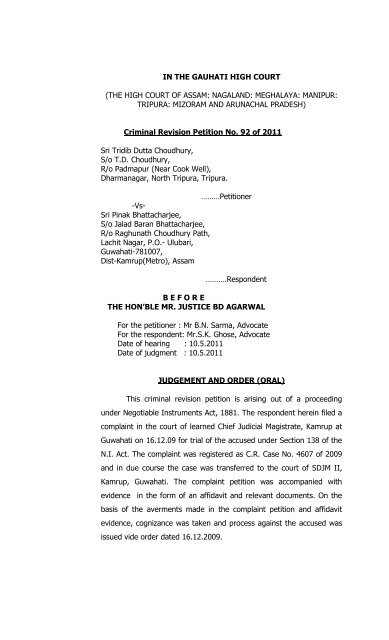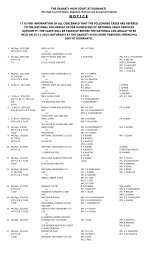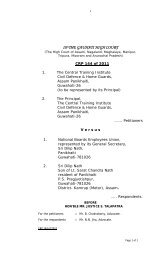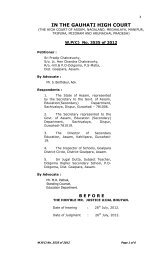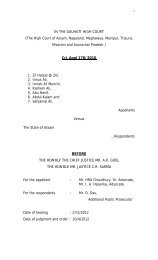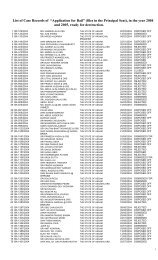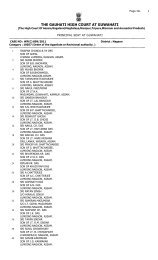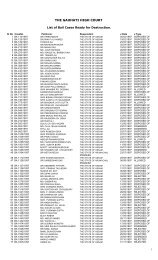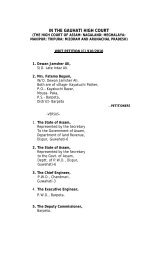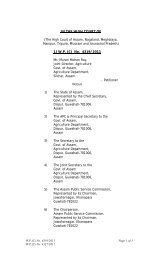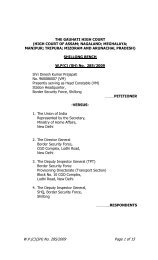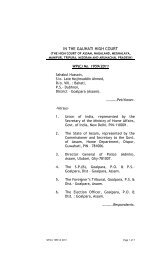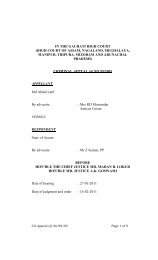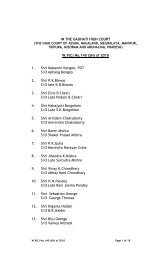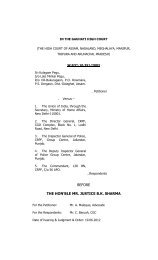Crl.Rev.P. 92/2011 - Gauhati High Court
Crl.Rev.P. 92/2011 - Gauhati High Court
Crl.Rev.P. 92/2011 - Gauhati High Court
You also want an ePaper? Increase the reach of your titles
YUMPU automatically turns print PDFs into web optimized ePapers that Google loves.
IN THE GAUHATI HIGH COURT(THE HIGH COURT OF ASSAM: NAGALAND: MEGHALAYA: MANIPUR:TRIPURA: MIZORAM AND ARUNACHAL PRADESH)Criminal <strong>Rev</strong>ision Petition No. <strong>92</strong> of <strong>2011</strong>Sri Tridib Dutta Choudhury,S/o T.D. Choudhury,R/o Padmapur (Near Cook Well),Dharmanagar, North Tripura, Tripura.………Petitioner-Vs-Sri Pinak Bhattacharjee,S/o Jalad Baran Bhattacharjee,R/o Raghunath Choudhury Path,Lachit Nagar, P.O.- Ulubari,Guwahati-781007,Dist-Kamrup(Metro), Assam……….RespondentB E F O R ETHE HON’BLE MR. JUSTICE BD AGARWALFor the petitioner : Mr B.N. Sarma, AdvocateFor the respondent: Mr.S.K. Ghose, AdvocateDate of hearing : 10.5.<strong>2011</strong>Date of judgment : 10.5.<strong>2011</strong>JUDGEMENT AND ORDER (ORAL)This criminal revision petition is arising out of a proceedingunder Negotiable Instruments Act, 1881. The respondent herein filed acomplaint in the court of learned Chief Judicial Magistrate, Kamrup atGuwahati on 16.12.09 for trial of the accused under Section 138 of theN.I. Act. The complaint was registered as C.R. Case No. 4607 of 2009and in due course the case was transferred to the court of SDJM II,Kamrup, Guwahati. The complaint petition was accompanied withevidence in the form of an affidavit and relevant documents. On thebasis of the averments made in the complaint petition and affidavitevidence, cognizance was taken and process against the accused wasissued vide order dated 16.12.2009.
22. After appearance in the court, the accused prayed for review ofthe order dated 16.12.09 on the ground that the affidavit of thecomplainant cannot be considered as initial deposition as contemplatedunder Section 200 of the Code of Criminal Procedure. The objection ofthe accused was over ruled vide order dated 13.12.10. Hence, theaccused has preferred this revision petition challenging both theorders dated 16.12.09 and 13.12.10.3. Heard Mr. BN Sarma, learned counsel for the petitioner and Mr.SK Ghosh, learned counsel appearing for the sole respondent.4. Mr. Sarma has submitted that the examination of thecomplainant is mandatory under Section 200 Cr.P.C. and an affidavitevidence of the complainant cannot be considered as sufficient forcompliance of Section 200 Cr.P.C. In support of his submission, learnedcounsel has relied upon the judgments of this court rendered in thecase of Abdul Kadir Choudhury –Vs- The State of Assam &Another; (1989) 2 GLR 53; L. Luisei, DF. O/C Phek –Vs-Vehkozo Chizo & Anr; (1987) 1 GLR 326; Sandip RoyChoudhury –Vs- Nupur Saha; 2005 (2) GLT 226 and thejudgment of Hon’ble Supreme <strong>Court</strong> rendered in the case of DamodarS. Prabhu –Vs- Sayed Babalal H; (2010) 5 SCC 663.5. On the other hand, Mr. Ghose, learned counsel for therespondent submitted that Section 145, inter-alia, was introduced inthe N.I. Act vide Act 55 of 2002 which empowers a court to acceptevidence in the form of affidavit. Learned counsel also relied upon thejudgment of this court rendered in Ranvijay Kumar Gupta, aliasPappu –Vs- Anand Kishore Madhesia; reported in 2010 (1) GLT533 to buttress his argument that the affidavit evidence in aproceeding under N.I. Act is admissible. In this case this court had alsotacitly accepted the affidavit evidence filed by the complainant at theinitial stage. It is true that in the said judgment the issue, as towhether complainant’s evidence by way of affidavit can be accepted ornot within the meaning of Section 200 Cr.P.C., was not decided.
3However, the court did not find any infirmity in accepting the saidevidence even at the time of taking cognizance of the offence. In thisregard, Mr. Sarma, learned counsel for the petitioner submitted thatthe affidavit evidence can be accepted only during trial and not at thestage of taking cognizance. In other words, the learned counsel for thepetitioner re-iterated that the personal examination of the complainantis sine-qua-non for taking cognizance of the complaint.6. Mr. Ghose, learned counsel for the respondent also raised apreliminary objection about the maintainability of the revision petitionon the ground that the order dated 13.12.10 is a preliminary orderand as such no revision petition is maintainable under Section 397(2)Cr.P.C.7. Apparently, order dated 16.12.09 is the primary order, takingcognizance of the complaint and 13.12.10 is the order rejecting theobjection of the accused on the legality in taking cognizance of thecomplaint. As noted earlier, the petitioner has challenged both theorders. Besides this, the order dated 13.12.10 cannot be said to aninterlocutory order inasmuch as the learned SDJM(S) has taken a finaldecision that there was no infirmity in taking cognizance of thecomplaint on the basis of the affidavit evidence. Hence, the objectionof the respondent about the maintenance of the revision petition ishereby rejected.8. In the case of Sandip Roy Choudhury (Supra), this court hasheld that examination of the complainant on oath is mandatory underSection 200 Cr.P.C. to prevent filing of false and frivolous complaints.However, the question involved in this revision petition is whether theprovisions of Section 145 of the N.I. Act will prevail over Section 200Cr.P.C. Other judgments cited by the learned counsel for the petitionerare not on the point.9. With regard to the acceptance of affidavit evidence to decidethe complaint under N.I. Act, it is necessary to reproduce Section 145of the N.I. Act, which is as follows :
4“ 145. Evidence on affidavit.- (I) Notwithstanding anythingcontained in the Code of Criminal Procedure, 1973 (2 of 1974), theevidence of the complainant may be given by him on affidavit andmay, subject to all just exceptions be read in evidence in anyenquiry, trial or other proceeding under the said Code.(2) The <strong>Court</strong> may, if it thinks fit, and shall, on theapplication of the prosecution or the accused, summon and examineany person giving evidence on affidavit as to the facts containedtherein.”10. It is seen that Section 145 has been introduced in the N. I. Actto prescribe a special procedure, dispensing with preliminary evidenceof the complainant, as could be gathered from the statement of theobjects of the Bill. Besides this, the submission of learned counsel forthe petitioner that affidavit evidence can be accepted only during trialand not during enquiry cannot be accepted in view of the languageemployed in Section 145. In other words, I am of the view that courtsshould liberally accept affidavit evidence, subject to exceptionincorporated in Sub Section (2), to advance the intention of thelegislature.11. The implication of Section 145 of the N.I. Act in the trial of acomplaint under section 138 of the said Act also came up for scrutinybefore the Apex <strong>Court</strong> in the case of Mandvi Cooperative BankLimited –Vs- Nimesh B. Thakore; reported in (2010) 3 SCC 83.In this case also their Lordships have re-iterated that Sections 143 to147 have been brought in the law with the sole objective of speedydisposal of the complaints. Their Lordships have observed that Sections143 to 147 were designed specially to lay down a much simplifiedprocedure for the trial of dihonoured cheque cases so that such casecan be decided expeditiously, even swifter than a summary trial. TheirLordship also observed that a complainant, who gives his evidence onaffidavit, cannot be asked to give oral deposition in examination-inchiefall over again, as it would amount to duplication of the evidenceand contrary to the intention of the legislature.
512. The Apex <strong>Court</strong> also declined to accept the proposition that Section145 is akin to Section 296(2) of the Code of Criminal Procedure. Theobservations of the Apex <strong>Court</strong> needs to be reproduced, which are asbelow :“ 29. Moreover, the crucial difference between Section 296(2)of the Code and Section 145 (2) of the Act is that the former dealswith the evidence of a formal nature whereas under the latterprovision, all evidences including substantive evidence may begiven on affidavit. Section 296 is part of the elaborate procedure ofa regular trial under the Code while the whole object of Section145(2) of the Act is to design a much simpler and swifter trialprocedure departing from elaborate and time-consuming trialprocedure of the Code. Hence, notwithstanding the apparent verbalsimilarity between Section 145(2) of the Act and Section 296(2) ofthe Code, it would be completely wrong to interpret the true scopeand meaning of the one in the light of the other. Neither thelegislative history of Section 296(2) nor any decision on thatsection can persuade us to hold that under Section 145 (2) of theAct, on being summoned at the instance of the accused thecomplainant or any of his witnesses should be first made to deposein examination-in-chief before cross-examination.”13. The judgment of the Apex <strong>Court</strong> rendered in the case ofDamodar Prabhu (Supra) is also not an authority under Section 145 ofthe N.I. Act. In the said judgment, the Apex <strong>Court</strong> was primarilyconcerned with compounding of an offence of cheque dishonour underSection 147. Their Lordships have observed that under Section 320Cr.P.C. except few offences under the Panel Code, no other offencesare compoundable. However, the Apex <strong>Court</strong> has held that in view ofthe non obstante clause, employed in Section 147 of the N.I. Act, thelimitations prescribed under Section 320 Cr.P.C. would not beapplicable. The legal principle laid down by the Apex <strong>Court</strong> isreproduced below :“ 12. Section 147 of the Negotiable Instruments Act, 1881 is inthe nature of an enabling provision which provides for thecompounding of offences prescribed under the same Act, therebyserving as an exception to the general rule incorporated in subsection(9) of Section 320 CrPC which states that “no offence shall
6be compounded except as provided by this section”. A bare readingof this provision would lead us to the inference that offencespunishable under laws other than the Penal Code also cannot becompounded. However, since Section 147 was inserted by way of anamendment to a special law, the same will override the effect ofSection 320 (9) CrPC, especially keeping in mind that Section 147carries a non obstante clause”.14. A bare perusal of Section 145 read with the observations madeby the Hon’ble Supreme <strong>Court</strong> in the case of Mandvi Cooperative BankLimited(Supra) and Damodar Prabhu (Supra) clearly indicates that thisprovision shall prevail over the procedure laid down under the Code ofCriminal Procedure, since Section 145 begins with non obstante clause.It is the settled position of law that if a particular procedure is laiddown in a special law that will prevail over the general procedure. Evenif there is conflict in the procedure prescribed in a special law from thegeneral law, the procedure laid down in the special law would prevail.The submission of Mr. Sarma, learned counsel for the petitioner that acomplainant can give his chief evidence in the form of an affidavit onlyduring trial stage and not at the initial stage has to be thoroughlyrejected in the light of the objectives of the amendments of the Actand the observations of the Apex <strong>Court</strong>. In my considered opinion, ifthis proposition is accepted and the scope of Section 145 is insulatedwith artificial limitations it would frustrate the very purpose for whichSection 145 has been introduced in law. Hence, I have no hesitation tohold that affidavit evidence can be accepted by the court at any stageof the trial, including at the time of taking cognizance of the complaint.However, if the court thinks fit it may direct the complainant to give hisoral evidence and may be cross-examined orally. I would like to addhere that the trial court should not insist oral examination in chief ofthe complainant mechanically and as a matter of course and thisdiscretion should be exercised judiciously and reasons should beassigned therefor.15. In the present case, cognizance has been taken under Section138 of the N.I. Act, which is a special law and Section 145, inter-alia,was introduced in the year 2002. Hence, the procedure laid down
7under Section 145 of N.I. Act has to be followed in preference toSection 200 Cr.P.C. for taking cognizance of a complaint.16. For the reasons alluded hereinabove, I hold that there is noinfirmity in taking cognizance of the offence under Section 138 of theN.I. Act on the basis of the affidavit evidence of the complainant.17. Consequently, the revision petition stands dismissed at theadmission stage. The stay order dated 17.3.<strong>2011</strong> stands vacated.18. Both the parties are directed to appear in the trial court on1.6.<strong>2011</strong> and receive further directions.UpadhayaJUDGE


